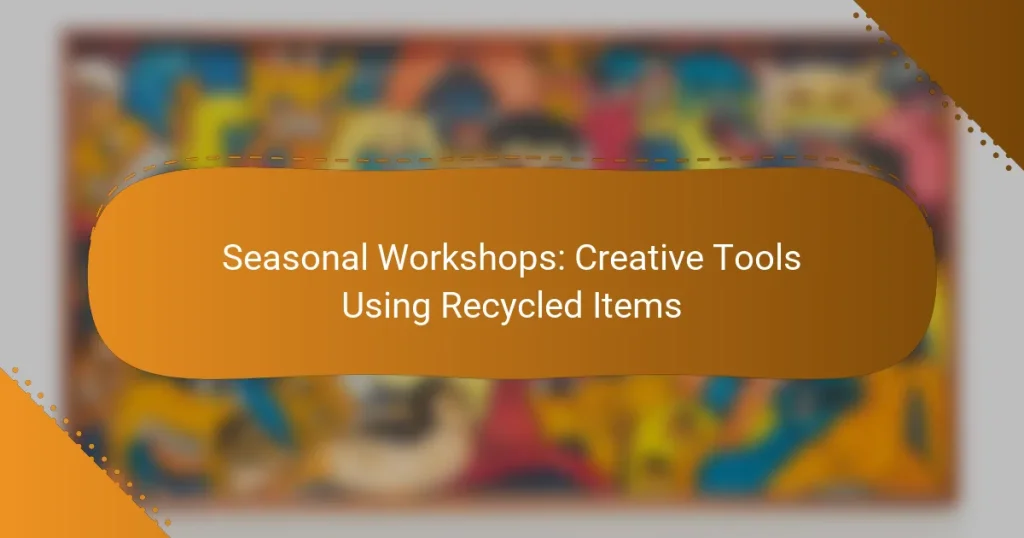Join our seasonal workshops that celebrate creativity and sustainability through the innovative use of recycled materials. Participants will engage in hands-on projects that transform everyday waste into functional and artistic creations, all while promoting environmental awareness. With essential crafting tools and a focus on safety, these workshops provide a unique opportunity to explore the intersection of art and eco-consciousness.
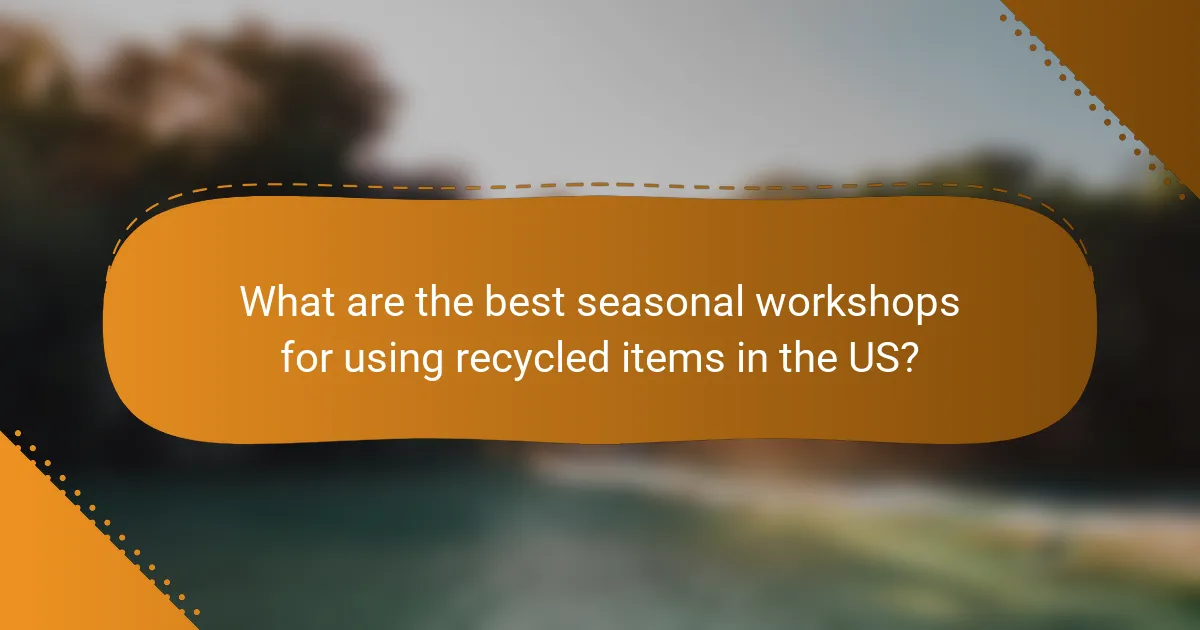
What are the best seasonal workshops for using recycled items in the US?
The best seasonal workshops for using recycled items in the US focus on creativity and sustainability, often incorporating local materials. These workshops provide hands-on experiences that promote environmental awareness while allowing participants to create unique projects.
Community art programs
Community art programs often host workshops that encourage participants to use recycled materials to create art. These programs may be organized by local arts organizations or community centers and can include activities like mural painting, sculpture building, or crafting decorative items. Participants can typically expect to work with items such as plastic bottles, old newspapers, and scrap metal.
To find a community art program near you, check local event listings or social media pages of nearby art organizations. Many programs are free or have a nominal fee, making them accessible to a wide audience.
School-based recycling projects
Schools across the US frequently implement recycling projects that engage students in using recycled materials for creative purposes. These projects can range from creating art installations to designing functional items like planters or bird feeders. Such initiatives not only foster creativity but also teach students about sustainability and environmental responsibility.
Teachers can enhance these projects by integrating lessons on the importance of recycling and waste reduction. Schools often collaborate with local artists or environmental organizations to provide expert guidance and resources.
Local craft fairs
Local craft fairs are excellent venues for workshops focused on using recycled items. Many fairs feature booths where artisans demonstrate how to create crafts from repurposed materials, such as jewelry made from old electronics or home decor from reclaimed wood. These hands-on sessions allow participants to learn new skills while supporting local artists.
Attending a craft fair can also inspire attendees to start their own projects at home. Look for fairs that specifically highlight sustainability or eco-friendly crafts to find workshops that align with your interests.
Online DIY classes
Online DIY classes have become increasingly popular, offering a wide range of workshops focused on using recycled materials. Platforms like Skillshare and YouTube host numerous tutorials that guide participants through projects such as making tote bags from old t-shirts or creating art from bottle caps. These classes provide flexibility, allowing you to learn at your own pace.
When selecting an online class, consider the materials you have available and the skill level required. Many classes are free or available for a small fee, making them an affordable option for those interested in sustainable crafting.
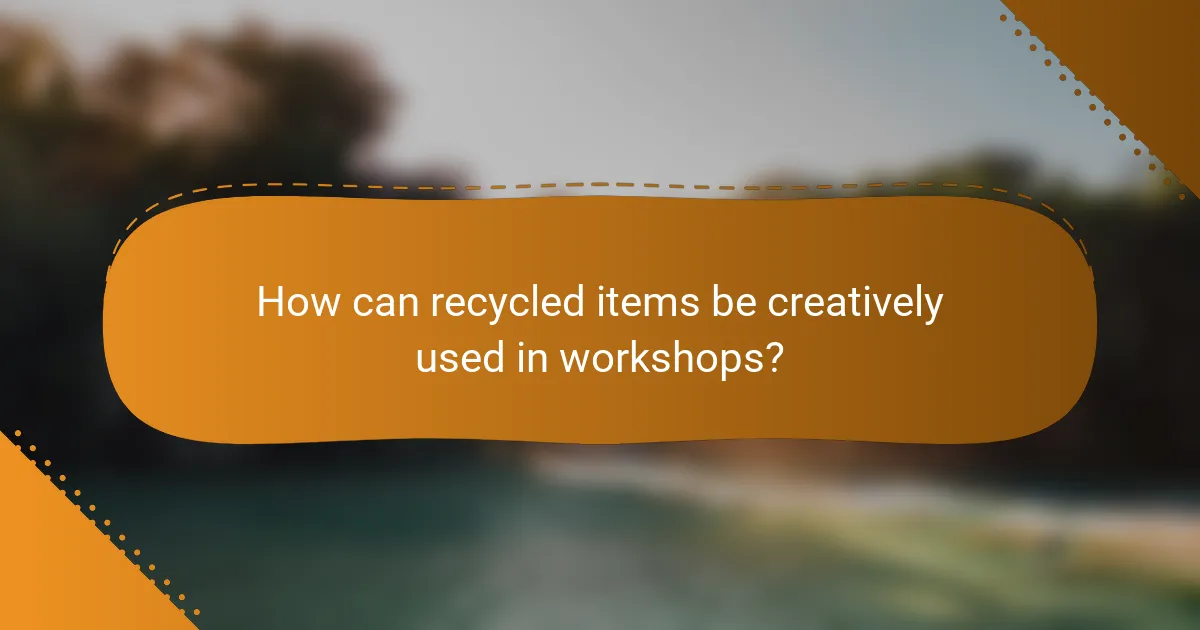
How can recycled items be creatively used in workshops?
Recycled items can be creatively utilized in workshops to promote sustainability and innovation. Participants can transform everyday waste into functional or artistic pieces, fostering creativity while reducing environmental impact.
Upcycling furniture
Upcycling furniture involves taking old or discarded pieces and giving them a new life through creative modifications. This can include repainting, reupholstering, or repurposing items for different uses. For example, an old wooden chair can be transformed into a stylish plant stand with a fresh coat of paint and some added shelves.
When upcycling, consider the materials’ condition and structural integrity. Ensure that any modifications maintain safety and usability. Simple tools like sandpaper, paintbrushes, and staple guns can help in the process, making it accessible for workshop participants of all skill levels.
Creating art from plastic bottles
Creating art from plastic bottles is an engaging way to reduce plastic waste while encouraging artistic expression. Participants can cut, paint, and assemble bottles into sculptures, wall art, or functional items like planters. For instance, a collection of bottles can be transformed into a colorful garden decoration.
Workshops can provide templates or ideas to inspire creativity, but participants should feel free to experiment. It’s important to use safe cutting tools and non-toxic paints to ensure a safe crafting environment. Encourage participants to think outside the box and explore various artistic styles.
Making jewelry from scrap materials
Making jewelry from scrap materials allows participants to create unique pieces while promoting recycling. Items such as old buttons, broken jewelry, and metal scraps can be transformed into necklaces, bracelets, or earrings. For example, a broken chain can be reimagined as a trendy bracelet with added charms.
Workshops should provide basic tools like pliers, wire, and clasps, along with guidance on design principles. Encourage participants to mix and match materials for a personalized touch. Remind them to check for sharp edges and ensure all components are secure to create wearable art safely.
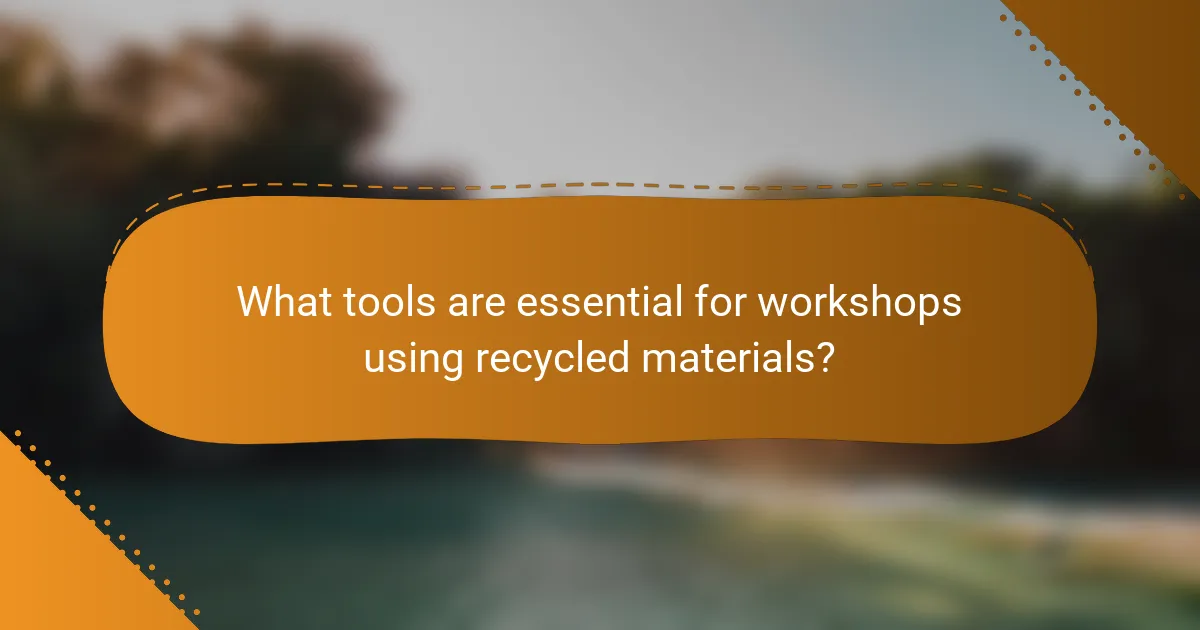
What tools are essential for workshops using recycled materials?
Essential tools for workshops using recycled materials include basic crafting tools, adhesives, and safety equipment. These tools facilitate the creative process and ensure a safe environment while working with various recycled items.
Basic crafting tools
Basic crafting tools are fundamental for any workshop focused on recycled materials. Scissors, utility knives, and cutting mats are essential for shaping and cutting materials like cardboard, plastic, and fabric. Additionally, having a variety of rulers, measuring tapes, and pencils can help achieve precise measurements and designs.
Consider including tools like hole punches and craft knives for more intricate work. A hot glue gun can also be beneficial for quick assembly, especially when working with lightweight materials. Ensure that tools are in good condition to avoid accidents and enhance efficiency.
Adhesives and fasteners
Choosing the right adhesives and fasteners is crucial when working with recycled materials. Hot glue is popular for its quick setting time and versatility, while PVA glue is ideal for paper and fabric projects. Double-sided tape can be a clean alternative for lightweight items.
For heavier materials, consider using screws or nails, especially when constructing larger projects. Always check the compatibility of the adhesive with the materials you are using to ensure a strong bond and durability.
Safety equipment
Safety equipment is vital in workshops that involve cutting and assembling recycled materials. Always provide safety goggles to protect eyes from debris and dust. Gloves can prevent cuts and abrasions when handling sharp objects or rough materials.
Additionally, consider having first aid kits on hand for minor injuries. Educating participants on safe handling practices and proper tool usage can significantly reduce the risk of accidents during the workshop.
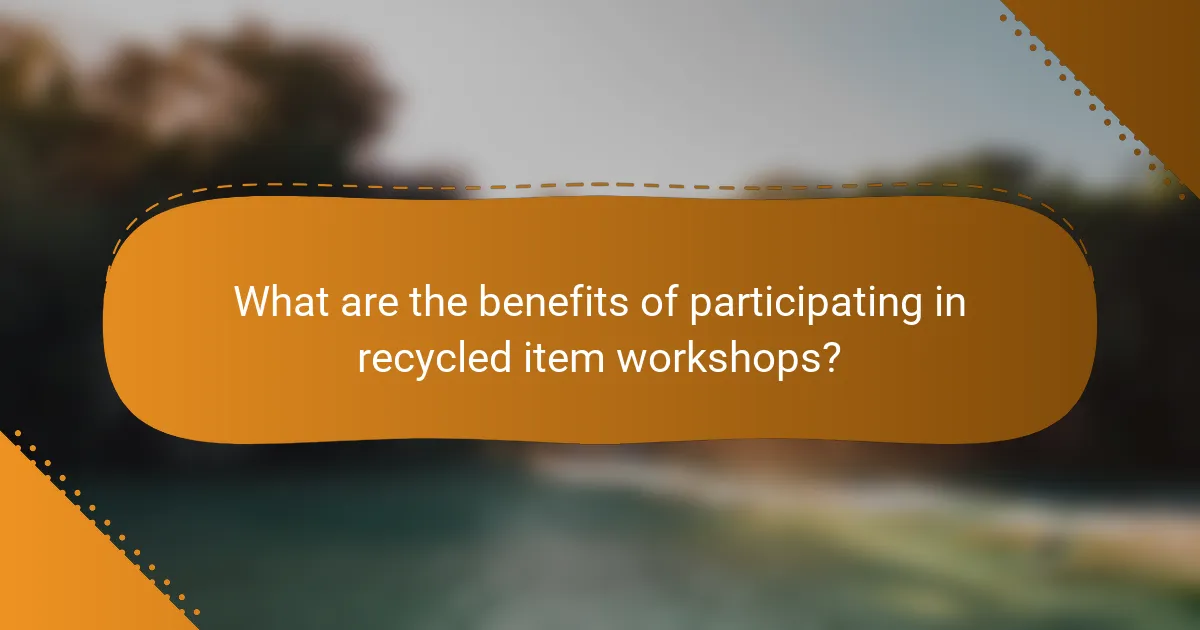
What are the benefits of participating in recycled item workshops?
Participating in recycled item workshops offers numerous advantages, including fostering environmental consciousness, enhancing practical skills, and promoting community involvement. These workshops not only encourage creativity but also provide a platform for individuals to learn how to repurpose materials that would otherwise contribute to waste.
Environmental awareness
Recycled item workshops significantly boost environmental awareness by educating participants about the impact of waste on the planet. Attendees learn how to identify recyclable materials and understand the benefits of reducing landfill contributions. This knowledge encourages more sustainable practices in daily life.
For example, participants might explore how common items like plastic bottles or old newspapers can be transformed into useful products. This hands-on experience reinforces the importance of recycling and inspires individuals to adopt eco-friendly habits beyond the workshop.
Skill development
These workshops are excellent for skill development, allowing participants to acquire new crafting techniques and practical skills. Individuals can learn various methods of upcycling, such as sewing, painting, or woodworking, which can be applied to future projects. This hands-on learning approach enhances creativity and problem-solving abilities.
Moreover, workshops often cater to different skill levels, making them accessible for beginners and experienced crafters alike. Participants can leave with tangible products, such as home decor or functional items, showcasing their newly acquired skills.
Community engagement
Recycled item workshops foster community engagement by bringing people together with a shared interest in sustainability and creativity. These events often encourage collaboration, allowing participants to share ideas and techniques, which strengthens community bonds. Engaging with others in a creative environment can lead to lasting friendships and networks.
Additionally, many workshops are organized by local groups or non-profits, creating opportunities for community members to support local initiatives. This involvement can lead to further projects that benefit the community, such as clean-up events or educational programs on sustainability.

What criteria should be considered when selecting a workshop?
When selecting a workshop focused on creative tools using recycled items, consider instructor expertise, materials provided, and workshop duration. These factors significantly impact the overall experience and learning outcomes.
Instructor expertise
The instructor’s background is crucial for a successful workshop. Look for someone with experience in both teaching and working with recycled materials, as they can offer practical insights and creative techniques. Check their portfolio or past workshops to gauge their skill level and teaching style.
Additionally, consider the instructor’s ability to engage participants. A knowledgeable instructor who can adapt to different skill levels will enhance the learning experience for everyone involved.
Materials provided
Evaluate what materials the workshop offers. Some workshops may supply all necessary items, while others might require participants to bring their own recycled materials. Understanding this can help you prepare adequately and avoid unexpected costs.
It’s also beneficial to know the quality and variety of materials provided. Workshops that offer a diverse range of recycled items can inspire creativity and allow for more innovative projects.
Workshop duration
Consider the length of the workshop, as it affects how much you can learn and create. Workshops can range from a few hours to multiple days. A longer workshop may allow for more in-depth exploration of techniques and projects.
Be mindful of your schedule and energy levels. If you’re new to crafting, a shorter session might be more manageable, while experienced participants may prefer longer, more intensive workshops to fully develop their skills.
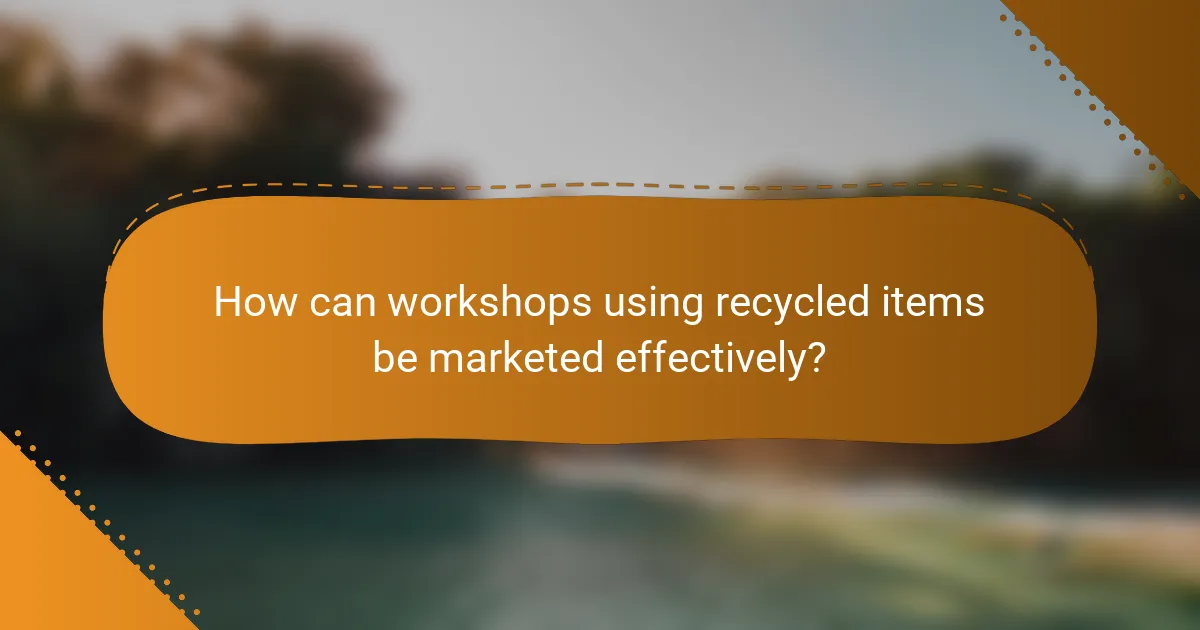
How can workshops using recycled items be marketed effectively?
Effectively marketing workshops that utilize recycled items involves leveraging various channels to reach potential participants. Focus on engaging storytelling and community involvement to highlight the benefits of creativity and sustainability.
Social media promotion
Social media is a powerful tool for promoting workshops focused on recycled materials. Use platforms like Instagram and Facebook to share visually appealing content, such as before-and-after photos of projects, participant testimonials, and short videos demonstrating techniques. Regularly posting updates and engaging with followers can build a community around your workshops.
Consider using targeted ads to reach specific demographics interested in sustainability and creativity. A budget of a few hundred dollars can yield significant reach, especially if you tailor your messaging to local audiences.
Collaborations with local businesses
Partnering with local businesses can enhance the visibility of your workshops. Collaborate with eco-friendly shops, art supply stores, or community centers to cross-promote events. This can include co-hosting workshops or offering discounts to customers of partner businesses.
Additionally, consider organizing joint events that showcase both your workshops and the partner’s products or services. This not only attracts more participants but also fosters a sense of community support for sustainable practices.
